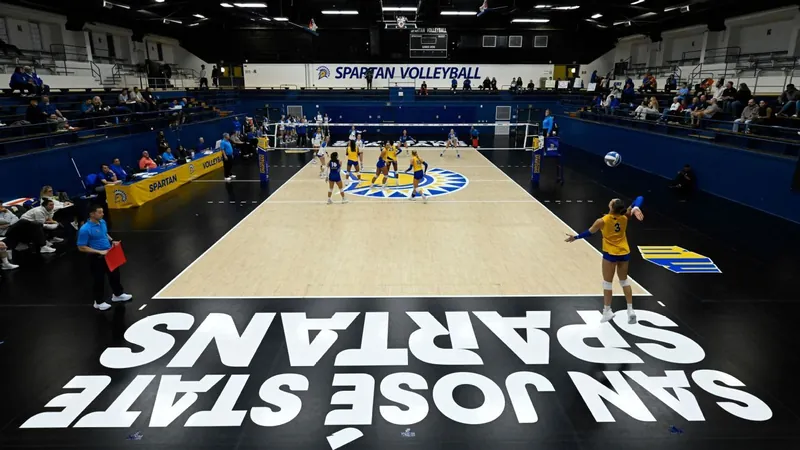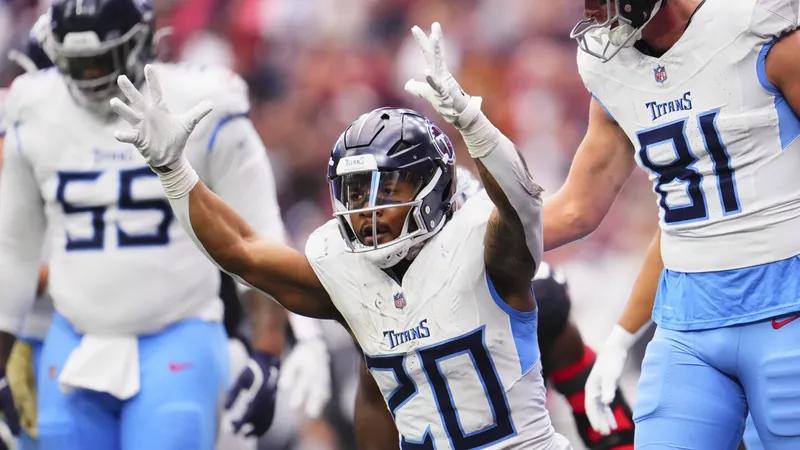
Inside the Polarizing Season of San Jose State Volleyball: A Controversy Explodes
2024-11-26
Author: Jessica Wong
Inside the Polarizing Season of San Jose State Volleyball: A Controversy Explodes
As the San Jose State Spartans navigate through a tumultuous volleyball season filled with protests and legal battles, the core of the controversy lies in the presence of a transgender player on the team. This topic has sparked a nationwide debate over inclusion and fairness in women's sports, drawing the spotlight onto the intersection of athletics and gender identity.
At a recent rally at the Reno-Sparks Convention Center, former University of Kentucky swimmer Riley Gaines stood alongside nine Nevada women’s volleyball players, voicing their concerns over competing against a team with a transgender athlete. The event, organized by the Independent Council on Women's Sports (ICONS), attracted around 400 participants who displayed signs insisting on the protection of women's sports.
The captain of the Nevada team, Sia Liilii, articulated her shock, saying, “I never expected to be blindsided, having to compete against a male athlete.” Similar sentiments have echoed throughout the Mountain West Conference, demonstrating a divide that persists not only among rival teams but also within San Jose State itself. Tension erupted recently as one of the Spartans' co-captains filed lawsuits arguing against the inclusion of the transgender player.
The complexity of the issue came to light earlier this year when a report was released identifying the player in question. San Jose State has remained tight-lipped, citing privacy laws, but maintains that all athletes are compliant with NCAA policies. Despite several institutions, including Southern Utah and Boise State, canceling matches against the Spartans due to this controversy, the tension only seems to escalate.
The ripple effect of this situation extends beyond the court. Since the inclusion of Lia Thomas, a transgender swimmer, competition policies regarding transgender athletes have become increasingly stringent. As of now, 25 states have proposed or enacted legislation limiting transgender women’s participation in women’s sports. The NCAA, which once encouraged a more inclusive approach, has also altered its policies, leading many to wonder about the future of transgender athletes in collegiate sports.
Brooke Slusser, a co-captain for the Spartans, has been at the forefront of this battle. She expressed concerns about safety and competition fairness, stating that physical disparities prompted her involvement in legal actions against the NCAA regarding the policies governing transgender athletes. The discourse took a tumultuous turn when Slusser and other Mountain West players claimed that there was a concerted effort to disadvantage her during a match, a serious accusation that reinforces the divisions within the team.
As the Spartans experienced a successful start to their season, they also found themselves entrenched in controversy. The tipping point came when the team was forced to forfeit six matches this season due to cancellations by competing teams unwilling to play against them, leading to significant ramifications for their standings in the Mountain West Conference.
Across the nation, politicians have weighed in. Notable figures, including vice presidential candidate JD Vance and president-elect Donald Trump, have publicly voiced their concerns over the safety and integrity of women's sports, rallying supporters around the contentious notion that "men should not compete in women's sports."
As the San Jose State Spartans near the end of their season, the battle for inclusion and fairness continues both on and off the court. The looming implications of these events speak to a broader societal divide regarding gender identity, challenging the landscape of collegiate athletics as we know it. What happens next is uncertain, but one thing is clear: the future of women's sports hangs in the balance, overshadowed by this polarizing debate.
With the Mountain West tournament on the horizon, all eyes will be on how these issues impact the players, the games, and the ongoing conversation about equality and justice in sports. Will the Spartans rally together or further divide? Only time will reveal the true cost of this controversy.




 Brasil (PT)
Brasil (PT)
 Canada (EN)
Canada (EN)
 Chile (ES)
Chile (ES)
 España (ES)
España (ES)
 France (FR)
France (FR)
 Hong Kong (EN)
Hong Kong (EN)
 Italia (IT)
Italia (IT)
 日本 (JA)
日本 (JA)
 Magyarország (HU)
Magyarország (HU)
 Norge (NO)
Norge (NO)
 Polska (PL)
Polska (PL)
 Schweiz (DE)
Schweiz (DE)
 Singapore (EN)
Singapore (EN)
 Sverige (SV)
Sverige (SV)
 Suomi (FI)
Suomi (FI)
 Türkiye (TR)
Türkiye (TR)